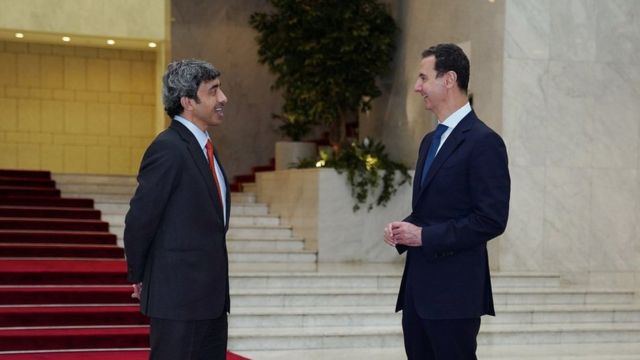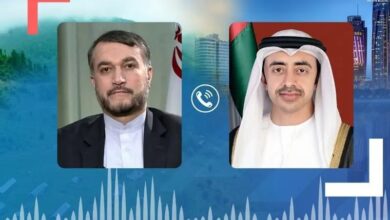Opinion: Delusions of Damascus
On Nov. 9, the foreign minister of the United Arab Emirates, Sheikh Abdullah bin Zayed al Nahyan met with Assad in Damascus. Nahyan is the most senior Emirati official to meet with Assad in the more than 10 years since Syria erupted into civil war. The diplomat’s visit signals a possible change in UAE policy toward Assad, who survived being toppled thanks to intervention by Russia and Iran, as well as his own brutality.

The Associated Press speculated that a rapprochement between the UAE and Assad could “serve both sides.” The UAE, the Associated Press pointed out, is home to thousands of Syrians — many of whom send money back to their home country. Meanwhile, Syria is feeling the sting of years’ worth of sanctions and a costly postwar reconstruction. Assad is an ally of Iran, the chief enemy of Saudi Arabia and several Gulf countries. The UAE has largely sided with the Saudis in the Middle East’s cold war but has displayed an independent streak in its foreign policy. The Associated Press noted that “most Gulf countries … seek warmer ties with Damascus, hoping to peel it away from Iran.”
The U.S., however, criticized Nahyan’s visit. State Department spokesman Ned Price said that Washington “was concerned by reports of this meeting and the signal that it sends.” Price added: “This administration will not express any support for efforts to normalize or rehabilitate Bashar al-Assad, who is a brutal dictator.”
But the condemnation from the U.S. rings hollow. The UAE isn’t the only Arab country looking to reestablish relations with Damascus. As the Foundation for Defense of Democracies’s David Adesnik has documented , the U.S. has largely been silent as other Arab allies have welcomed Assad back into the fold.
In July 2021, Egypt and Jordan pressed the U.S. to let Syria participate in a multistate deal to export gas and electricity to Lebanon — a move that required the U.S. to waive human rights sanctions. Lebanon is heavily influenced by Iran, the world’s chief state sponsor of terrorism. The U.S. acquiesced, approving the deal in August. The decision, Adesnik pointed out, showed Arab governments that they now had a “green light to engage with Assad.”
Indeed, as Adesnik noted, when it comes to its enforcement of the Caesar Syria Civilian Protection Act of 2019, an act aimed at holding Syria’s human rights abusers accountable, the Biden administration “has sanctioned only a handful of targets, none of which are economically significant.”
Assad’s cousin, Ali Makhlouf, has also recently been spotted driving a fancy sports car in Los Angeles — raising questions about how he got into the country. Makhlouf’s father, Rami, has been sanctioned for his role in helping Assad perpetrate atrocities against Syrian civilians. For its part, the U.S. might be seeking to normalize Assad in the hopes of securing a new deal with Iran over Tehran’s illegal nuclear weapons program.
Or perhaps the U.S., like its Arab allies, hopes to tilt Assad away from Iran. If so, this is deluded thinking. Syria is ideologically simpatico with, as well as deeply beholden to, both Russia and Iran.
Damascus has long used state-sponsored terrorism as a tool both to maintain its relevance and exert regional power. Syria has plundered Lebanon, supported Palestinian terrorists, and equipped and trained terrorists to murder and maim Americans in Iraq. There is no evidence to suggest that the regime has changed.
Source: washingtonexaminer





